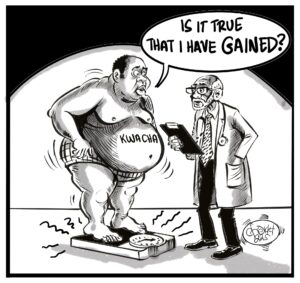THE State has submitted that Energy Minister Matthew Nkhuwa’s decision to declare the Copperbelt Energy Corporation’s transmission and distribution lines as a common carrier, was not made in bad faith.
Attorney General Likando Kalaluka has argued that the said decision was made within the legal limits of Section 15 of the Electricity Act and was further based on the fact that there was an impending crisis that would have led Konkola Copper Mines (in liquidation) not to have power supply.
He has, therefore, asked the Lusaka High Court to dismiss CEC’s application for judicial review against the said decision by Nkhuwa, arguing that the decision-making process of the impugned resolution was legal and procedurally correct.
On September 29, this year, the Court of Appeal granted CEC leave to commence judicial review proceedings in the Lusaka High Court against Nkhuwa’s decision to declare its transmission and distribution lines as a common carrier.
Court of Appeal judges Mubanga Kondolo, Flavia Chishimba and Judy Zulu-Mulongoti, ordered that the judicial review proceedings should be heard before another judge.
This was after Lusaka High Court Judge Mwape Bowa refused to grant CEC leave to commence judicial review proceedings to challenge the said decision by the Energy Minister in June, 2020.
CEC, which has cited the Attorney General and the Energy Regulation Board (ERB) as respondents, is seeking a declaration that Nkhuwa’s decision to declare its transmission and distribution lines as common carrier was unlawful.
It also wants a declaration that the decision by the Director General of the Energy Regulation Board of May 31, 2020 to direct it to charge a wheeling tariff of US$5.84/kw/per month was illegal and therefore null and void.
CEC further wants an order to quash the said decisions and a further order to stop Nkhuwa from enforcing SI no.57 of 2020 as it is illegal.
But according to an affidavit in opposition to the originating notice of motion for judicial review filed in the Lusaka High Court, December 1, Trevor Kaunda, the Permanent Secretary in the Ministry of Energy, stated on behalf of the Attorney General, that this was not a matter fit for judicial review.
He stated that on May 29, 2020, Nkhuwa, pursuant to the Electricity Act No. 11 of 2019, issued the Electricity (common carrier) (Declaration) Regulations S.l No. 57 of 2020.
Kaunda stated that in the said Statutory Instrument, the transmission and distribution lines operated by CEC were declared as common carriers for purposes of the Electricity Act.
“The said Statutory Instrument further stated that the transmission and the distribution lines are to be used on the terms and conditions determined by the Energy Regulation Board,” he stated.
Kaunda stated that on the same May 29, 2020, the Minister wrote a letter to the CEC Managing Director regarding the wheeling of power on behalf of ZESCO.
He stated that in the said letter, it was guided that CEC should continue to provide a wheeling path for ZESCO’s power supply to KCM while the two parties finalised the formal wheeling agreement as required by law.
Kaunda stated that the said letter further indicated that this action was only a temporary measure undertaken before the parties concluded the formal wheeling agreement.
“On May 30, 2020, I wrote to the applicant (CEC) informing them of the declaration of its infrastructure as a common carrier and that the applicant was to allow access whilst negotiating the wheeling agreement. The applicant has never been denied an opportunity to negotiate as at the time, there was not enough time to have negotiations concluded by June 1, 2020 and thus the putting in place of the temporal measures,” he stated.
Kaunda stated that CEC had not been prevented from enforcing its rights against KCM as alleged as there were various avenues available to it to pursue KCM for its debts.
And in the skeleton arguments in opposition to CEC’s application for judicial review, Kalaluka submitted that the Minister’s decision was not made in bad faith as it was made within the legal limits of Section 15 of the Electricity Act which states that the Minister may, by statutory instrument, declare a transmission or distribution line as a common carrier for the purposes of this Act.
“Further, the Minister’s decision was not made in bad faith as his decision was based on the fact that there was an impending crisis that would have led KCM not to have power supply. However, because ZESCO dos not have its own infrastructure to facilitate the transmission needed to supply power to KCM, the Minister invoked his power under section 15(1) of the Electricity Act to issue a statutory instrument declaring the applicants transmission and distribution lines a common carrier,” he stated.
“In conclusion, we pray that this Honourable Court should dismiss the application for judicial review because the decision making process of the impugned decision was legal, procedurally correct and made in good faith. We also pray that costs of this application should be borne by the applicant.”
In its notice of application for leave to apply for Judicial Review, CEC had stated that it had been the main supplier of power to the Mines on the Copperbelt, consequently to which it had entered into various existing long term power supply agreements, including that with KCM whose term expired in March this year, but was extended to May 31, 2020 by consent of the parties.
It stated that on March 31 this year, Nkhuwa announced that they had decided to impose “unilateral” and non-negotiable terms for an interim arrangement between CEC and Zesco, terms CEC did not accept.
CEC added that Zesco had nonetheless made attempts to enforce these unilateral terms and communicated its position in various correspondencies.
“While the power supply agreement issued between CEC and Zesco continued to be unsettled, another matter arose following CEC’s attempts to recover a debt in excess of US$144 million owed to it by KCM,” it stated.
CEC stated that KCM, as its customer, was under a duty to pay its electricity bills for power supply received from it, adding that CEC was legally entitled to suspend supply of electricity to the mine whenever KCM defaulted in its duty to settle the bills.
“As at May 31, 2020, KCM owes the applicant (CEC) US$144million cumulatively for a period of 12 months, the amount continues to increase,” it stated.
CEC further stated that on May 28 this year, Nkhuwa wrote to them, asking that they give a wheeling path to Zesco to supply power to KCM and it was at this point that it (CEC) realized the customer Zesco was referring to was in fact KCM.
“CEC insisted that it would restrict power supply to KCM since the power supply agreement with KCM has expired, and because KCM was indebted to CEC and did not seem interested to settle its debt,” it stated.
CEC stated that Nkhuwa, however, on May 29, 2020, declared its transmission and distribution lines as common carrier, a declaration which was intended to facilitate transmission of power from Zesco to KCM using CEC infrastructure.
It added that following Nkhuwa’s directive, it had continued to supply KCM with power despite there being no power supply agreement and despite the Mine’s indebtedness to it in excess of US$144 million.
CEC added that the minister’s decision to declare its transmission and distribution lines as a common carrier via SI no. 57 of 2020 was ultra vires section 15 of the Electricity Act.



















